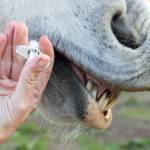Avoid Antimicrobial Resistance in Horses

Be honest: how many antibiotic products do you have on hand for your horse? While it may be tempting to treat small wounds, a niggling cough, or some other ailment with “what the vet gave last time,” experts agree that misuse of antibiotics contributes to antimicrobial resistance (AMR), putting all animals, including humans, at risk.
In a recent review article on the topic*, a group of veterinary researchers wrote that AMR is “amplified by unnecessary use, overuse of broad-spectrum antimicrobials, subinhibitory dosage, or inappropriate duration of treatment.” Antimicrobial resistance may occur in these scenarios:
-
Giving leftover antibiotics to a horse different than the one the prescription was intended for, as that original horse didn’t receive its full course of treatment. Inappropriate duration of treatment can contribute to resistance.
-
Administering antibiotics to a horse without veterinarian oversight. This potentially could result in offering an ineffective medication at an incorrect dose, adding to the resistance problem.
-
Requesting a horse be treated with an antibiotic when a veterinarian suggests the condition is viral, inflammatory, or self-resolving, and does not require an antibacterial drug.
-
Failing to perform culture and sensitivity assays or conducting other laboratory tests to select appropriate antibiotics, especially when patients are unresponsive to a previous treatment.
“As highlighted by the researchers, the optimal use of antimicrobials is a cornerstone in the fight against antimicrobial resistance,” shared Laura Petroski-Rose, B.V.M.S., a veterinarian for Kentucky Equine Research.
Four key ways to fight antibiotic resistance include (1) a reduction of overall antimicrobial consumption; (2) improved use of diagnostic testing; (3) prudent use of second-line, critically important antimicrobials (i.e., not using “advanced” antimicrobial drugs to treat routine animal cases); and (4) optimization of dosage regimens (i.e., research-based, detailed dosages and treatment durations for specific conditions commonly affecting horses).
As long as your horses are happy, healthy, and responding to antimicrobials, why should you care about resistance?
In a nutshell, the day could come when go-to medications simply do not work, leaving horses at risk for diseases that once were curable. In addition, antimicrobial resistance impacts human medicine as well, leaving you at risk for serious complications following infection with once-treatable diseases.
“In lieu of reaching antimicrobials as a cure-all, follow the above-described advice regarding antibiotic administration in horses, preferably under direct guidance from your veterinarian,” advised Petroski-Rose.
In addition, optimizing overall health through appropriate nutrition, particularly in times of stress such as transport, weaning, and extremes in temperature, can help support the immune system. Omega-3 fatty acids such as the DHA and EPA found in EO-3, developed by Kentucky Equine Research, also support the immune system and help fight infections.
*Guardabassi, L., M. Apley, J. E. Olsen, et al. 2018. Optimization of antimicrobial treatment to minimize resistance selection. Microbiology Spectrum 6(3).








